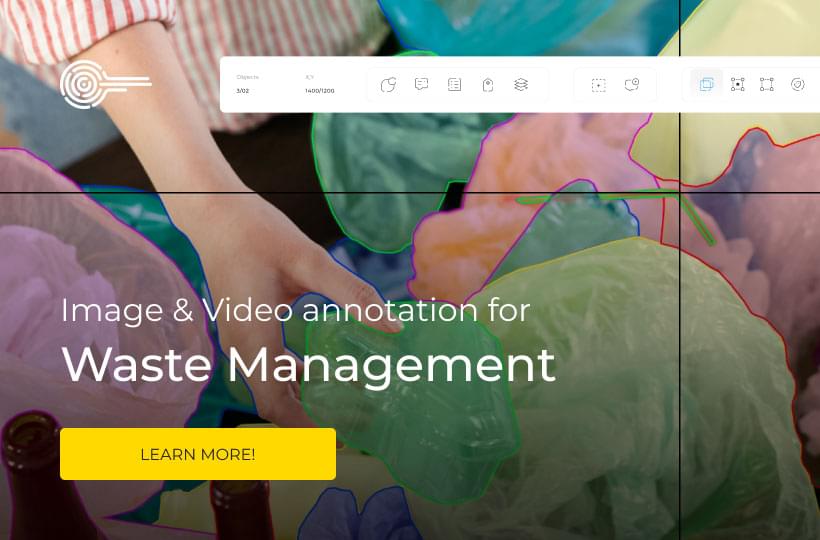Labeling Tools Can Sort Our Waste Problems (Better Recycling Using AI)
There’s a reason that waste management isn’t front-page news. Most people would rather not know how trash is handled. When those black plastic bags leave our doorsteps, we aren’t concerned with their travel plans. The modern world handles waste with ever-improving efficiency, despite trash problems in major cities like New York.
The waste management industry needs something called a semantic segmentation labeling tool. That’s defining the different parts of an image down to the pixel level. It’s vital because it allows us to accurately recycle more material much faster. 14 million tons of plastic debris enter the oceans annually.

We need AI labeling tools to keep our heads above water, so to speak. Sorting reusable plastic is an enormous task and still a manual process for many countries. We'll pollute less by using a segmentation labeling tool to classify garbage debris. AI systems are trained to optimize plastic recycling with varying levels of human input.
How We Handle Waste Is Creating A Worldwide Waste Catastrophe
Despite our best efforts, the way we manage waste is harming the planet. The result is polluted waterways, harm to plants and animals, and an uptick in diseases. Our landfills pollute soil, and our plastic floats through the oceans en masse. One UK company estimates that 5.25 trillion pieces of plastic drift in our seas. Even with our fanatical focus on recycling, we aren’t as effective as some people might expect.
Some nations have excellent waste management infrastructure. With a rate above 65%, Germany is a world leader in recycling. Countries like South Korea, Austria, Switzerland, and Sweden all have rates above 50%. In the United States, less than 10% of plastic waste is reused. We desperately need to limit the waste we return to nature.
AI Can Optimize Waste Management And Improve Working Conditions
Manual labor is a big part of the recycling process for many countries. Germany uses Recycleye, a robotic sorting system with impressive stats. It saw success in France, Italy, and the UK, boosting output by 12% at some facilities. Using an object detection labeling tool, a single machine can pick up 55 pieces per minute. The software has an impressive 1% rate of contamination. In the US, the rate of contamination is roughly 25%. Receycleye's CEO said that “waste doesn’t exist, only materials in the wrong place.”
The same kind of technology can be applied before the waste arrives at the sorting facility. Bin-e is a Polish company that aims to start sorting trash as it enters dumpsters. This tech is currently aimed at larger industries, not household trash. For example, some companies have glass, paper, or wood bins. An AI labeling tool could sort the contents, boosting efficiency and improving transportation.
We need AI labeling tools to play a more active role. For waste management, working conditions in European countries are the highest in the world. For medical and chemical waste, intelligent sorting systems offer ways to protect human workers from hazards. AI labeling tools work in tandem with robotic systems to highlight dangerous objects.

Intelligent systems can also:
- Check levels in trash cans and dumpsters
- Optimize garbage collection routes
- Use a segmentation labeling tool to detect hazardous material
- Improve wastewater operations
- Predict future waste management needs and obstacles
Implementing AI Waste Management For Third World Countries
Developing nations face significant hurdles when it comes to recycling. It requires a massive investment that many can’t afford. Aside from that, these countries have other priorities. Also, the margins are razor thin for reselling recycled plastic, and the other benefits are long-term.
Germany has the fourth highest GDP in the world, so naturally, their waste management reflects that.
Pollution doesn’t need a passport and has no respect for borders. There’s a growing consensus that we need to tackle this problem as a global issue. There’s an avoidance of responsibility that still exists today. Countries like Canada have faced criticism for shipping garbage to the Philippines.
As European countries implement intelligent strategies, we must make similar advances in developing nations. Humans produce an estimated two billion tons of garbage annually. That number is predicted to rise to 3.4 billion by 2050. If we aren’t sorting and recycling efficiently by then, the environmental impact could be catastrophic.